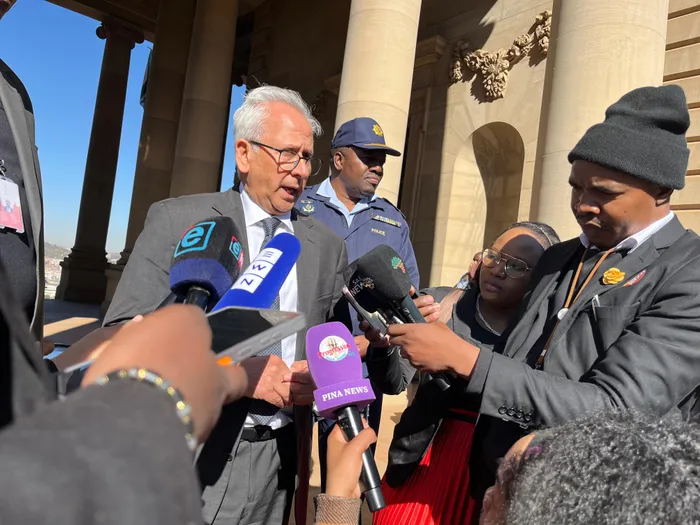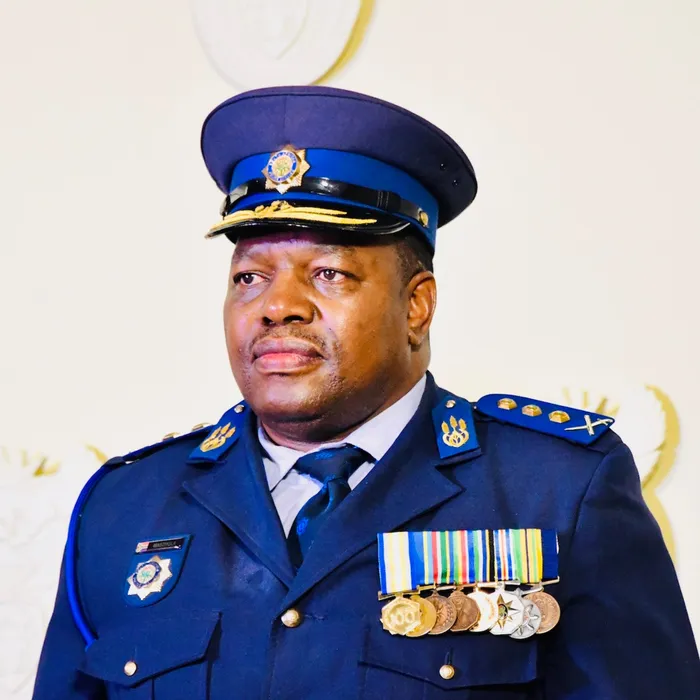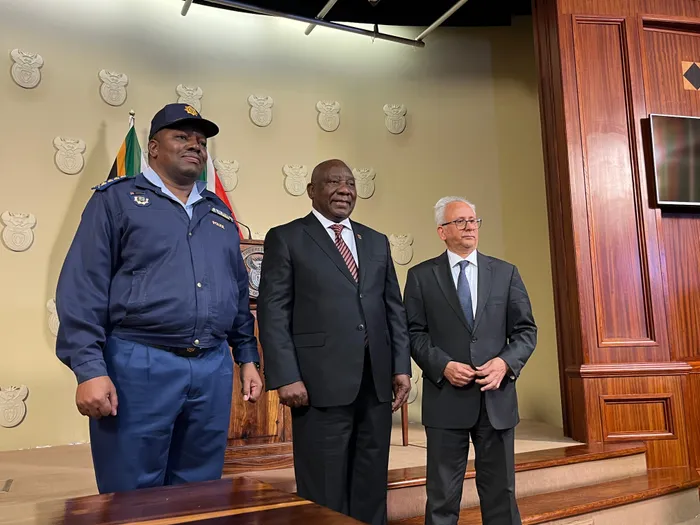
Speaking to media shortly after his swearing-in ceremony at the Union Buildings in Pretoria on Friday, Professor Firoz Cachalia signalled a calm but resolute approach to the nation’s crime crisis.
Image: Picture: Kamogelo Moichela/IOL Politics
While it may be only a little over a month since Professor Firoz Cachalia was appointed Acting Minister of Police, he finds himself facing numerous challenges, including public and media scrutiny, as well as internal tensions within the police structure.
He must contend with the fact that public trust in the police is currently at a low point; SAPS detectives at police stations being overwhelmed and severely under-resourced; the allegations made by KwaZulu-Natal Police Commissioner, Lieutenant General Nhlanhla Mkwanazi; and now also his recent clash with National Police Commissioner, Fannie Masemola, regarding the revival of the KwaZulu-Natal Police Killings Task Team’s investigation.
Political parties have already given the Acting Minister a tall order to deliver from day one.
Democratic Alliance’s Ian Cameron wrote to Cachalia on his first day in office, telling him that South Africans are tired of ministers who deliver bold speeches but fail to act.
“What is needed now is decisive, immediate, and lasting action, from day one. The DA sets Cachalia a clear and unambiguous challenge: Start delivering from today.”
They quickly assigned him a laundry list of tasks that they expected him to complete.
Meanwhile, the MK Party maintained that appointing Cachalia is unconstitutional, flagging serious legal and procedural violations where they lodged an urgent application in the North Gauteng High Court in Pretoria challenging it.
They also disputed the establishment of the Madlanga Commission of Inquiry, which was created following explosive allegations levelled against former police minister Senzo Mchunu by Mkwanazi.

National Police Commissioner General Fannie Masemola said progress had been made in identifying the source of firearms.
Image: Picture: Siyabulela Duda/GCIS
He also attended the INTERPOL’s African Regional Conference, where he said he highlighted the threat of transnational organised crime.
On top of that, he is having to deal with a recent spate of shootings on the Cape Flats, which claimed more than 30 lives in just weeks, and the DA hoping to find a sympathetic ear to their devolution cause.
While some individuals feel it is too soon to weigh up how Cachalia is faring in the position, with one UCT expert saying, “No one can answer them because nobody can assess him after one month in the job. Please don't bother us with such frivolous questions; we have work to do.”
However, it does remain critical to emphasise the context that the acting minister is finding himself in, and how everything he is doing is under a microscope because he didn’t appear out of thin air.
Cachalia was previously the chairperson of the National Anti-Corruption Advisory Council (NACAC), created by President Cyril Ramaphosa, which just submitted its close-out report to him.
The NACAC was set up in September 2022 to guide the implementation of the National Anti-Corruption Strategy and, among other things, to advise on strengthening the state’s anti-corruption architecture.
The NACAC close-out report, which will be released publicly, consists of a set of recommendations which, amongst others, include the establishment of a permanent, independent, overarching anti-corruption body.
Ramaphosa said: “The report, observations and recommendations clearly demonstrate the extensive work and significant thought that NACAC has applied to these challenges. NACAC has given full effect to its mandate and has provided a firm, evidence-based foundation to take forward a comprehensive response to corruption.
“The observations and recommendations will, as a matter of priority, receive the attention of the National Executive and the relevant institutions.”

President Cyril Ramaphosa has officially appointed Firoz Cachalia as Minister of Police. Pictured alongside the President is National Police Commissioner Fannie Masemola.
Image: Kamogelo Moichela
Commenting on whether his previous role created blurred lines, political analyst Nkosikhulule Nyembezi said it remains up for debate.
“Whether Cachalia’s historical background as the former chairperson of NACAC, or his approach to disagreements with the national police commissioner, will add value to his role is a matter for debate and for the proving ground of history. What cannot be disputed is that his outspokenness is a radically different approach from what came before.”
Another analyst, Professor Sipho Seepe, added: “I think that within a moment of crisis, the president would want people who are going to hit the ground running. You would not want people who are still going to take time to familiarise themselves with challenges.
“As somebody who has been part of NACAC, he comes in as somebody who is informed, but at the same time, you also have somebody who has been in government as a former MEC, so when you are a former MEC, it also means that you have an understanding of government protocols, and an understanding of how government works.”
Seepe explained that if the president were to be questioned on why he felt compelled to choose Cachalia, he could say that he chose Cachalia as he was familiar with government and its challenges in fighting crime.
He added that Cachalia comes into a portfolio dealing with immense pressure and public scrutiny.
“It is the most important portfolio, but this portfolio has been drawn into a spectacle where Mkwanazi made very serious allegations, allegations that could undermine the entire criminal justice system. The police are very important in dealing with the issue of crime, in the same way that you can talk about the nurses in the healthcare system, and how, without them, the entire system collapses. So this portfolio is the backbone of our fight against crime.
“So Cachalia is now appointed into what you may call a political quagmire. The second thing is that he comes in as acting minister, and even though you have the power, you also have people who still harbour the notion that you might be there temporarily.
“When people consider you to be a passerby, they tend not to take you seriously, but at the same time, it could also be a source of strength that you could then make decisions that you know could outlive you. Being an acting minister could both be a positive and a negative.”
Nyembezi added that, as for Cachalia’s leadership style, the answer is a lot less clear-cut on whether it does what it claims and intends socioeconomically or politically.
“Will it help to make the country safe and support coordination of crime prevention strategies at all three levels of government? Will it win the investor confidence and the public’s backing as the local government electoral cycle unfolds? Here, the answers are much less clear-cut.
“Successful government ministers need to give themselves elbow room. They need to be able to make mistakes and not be derailed by them. They need to be able to get some things wrong while trying to get the big things right,” Nyembezi said.
“Modern politicians like Cachalia, who are part of a coalition government, operate in an unforgiving culture of corruption and maladministration. The public is indifferent towards palace politics, determining ministerial appointments and sceptical about the government.
“Much mainstream media treats political figures with undisguised contempt because of their somersaulting decisions and actions. Social media has empowered the mob. Relatively small failings can have relatively large consequences,” Nyembezi said.
“Even so, a government whose overarching message is in tune with the times and the public mood is not doomed to failure. Cachalia should canvass the public to give him the political space to make mistakes, because we can trust him to aim unerringly towards the right goals.
“He can tell that story from the start. The political space he is in gives him time to do things right. But not unlimited time.”
theolin.tembo@inl.co.za